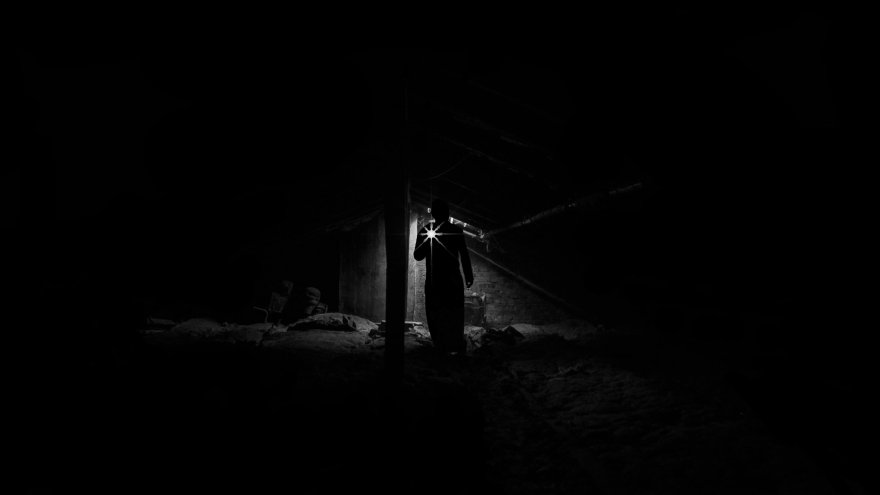Don’t Be Afraid of the Dark: How to Run Overnight

It was after midnight when I took off running down the Virginia Creeper Trail, leaving the last turnaround point behind me. I was 67 miles into the Yeti 100 Endurance Run, so the field was spread out and I couldn’t see or hear any other runners. I turned a corner on the trail, looking at the bright stars above me. A rustle and a crash in the woods broke my concentration and I stopped dead. A fat raccoon waddled out of the trees and stared at me. Two smaller raccoons trailed behind her, scurrying across the trail and into the woods on the other side. Any other time it would have been funny. But at that point, I just ran as hard as I could until I found another group of runners. They were walking, so I joined them for company’s sake. My next pacer was eight miles away, and I lost a lot of valuable time.
Running ultras that take place overnight, usually 24 hours or longer, can be a challenging experience. If you go into it prepared, however, you can fight the fatigue and stay mentally strong throughout the toughest part of the race.

Gear
When the sun sets, a headlamp is the most obvious piece of equipment you should have. Backup batteries, or a way to charge the light while you’re using it, are also a necessity. Coordinate your clothing with the time of sunset by having your warmer layers either in your drop bag or with your crew. Even if the temperature only drops ten degrees, it will get harder to warm yourself up the longer you’ve been running. Put layers on as soon as you start to feel a chill. At minimum, you should have gloves, fresh socks, a hat, and a jacket at your disposal—more if it’s a wintertime race. Buffs are another great item to have on hand, since they can function as headbands, hats, neck warmers, sweat rags, ear warmers, and more.
Mental Strength
The mental game of ultra running is one of the biggest selling points for many people, though one of the hardest to plan for. You never know where your head will take you during a race, especially after you become fatigued. Mantras are a popular tool that many professional runners use to keep themselves moving throughout a race. Repeating a phrase or word either mentally or out loud can help you to keep moving forward.

I practiced saying the words “hold fast, all storms pass,” a quote from Conrad Anker. While running Bryce Canyon 100, ultra runner Jason Thienel repeated what he was going to get at the next aid station: “two pancakes, and a cup of coffee.” Mantras are highly personal, and sometimes situational. You may create your own throughout the race, or have one that you develop during training.
Pacers
Pacers are the unsung heroes of ultra running. They run with us, they make us eat, they hold our hair while we puke, and they scare the monsters away. Hallucinations are common, with shadows and tiredness working together to create everything from Big Foot to non-existent aid stations. Well-rested pacers can help ground you in reality and stay on course.

Choose pacers that will encourage you, keep you moving, and are dedicated to helping you finish. Make sure that they have trained well and are just as familiar with the course as you are. Your pacers need to be strong enough runners to pay attention to you, and not be struggling themselves. If you can’t have pacers, talk to other runners! Everyone is going through similar things and most people are happy to have some company.
Practice
While training for an ultra, many runners fail to practice running at night. Occasional night time runs, especially if trails are available for you to run on, can be beneficial in getting more comfortable with the feeling of running at night. Another training tool that many runners overlook is an overnight long run. Planning the logistics of an overnight run can be difficult, since many trails are closed at night, however, it is an invaluable experience. An overnight long run, especially after a long work day, can help set you up for the feelings of fatigue and discouragement that you may face late in a race. Plan to have friends or even your pacers run with you, and others support you with food and water. It’ll familiarize you with night running technique and let you test out your gear. Make sure you have a nice rest day to nap and recover afterwards!

Race Day
Many of your well-intentioned plans will fall apart on race day—that’s the nature of ultra running. However, it will inevitably get dark, and you will have to deal with it. Trust in your training, and trust in yourself. Put on some music, don’t forget to pick up your feet, and conquer the darkness!
Latest Articles
 Is Running on a Treadmill Easier Than Running Outside?Runners have their own preferences, whether it is treadmill running, running outside on the road, or exploring trails. So...
Is Running on a Treadmill Easier Than Running Outside?Runners have their own preferences, whether it is treadmill running, running outside on the road, or exploring trails. So... Is It OK to Use Trail Running Shoes on the Road?While trail running shoes can be used on roads, especially in situations where a runner encounters mixed terrains or pref...
Is It OK to Use Trail Running Shoes on the Road?While trail running shoes can be used on roads, especially in situations where a runner encounters mixed terrains or pref... How to Fix Sore Quads After Running?Rest, ice, gentle stretching, and over-the-counter pain relievers can help soothe sore quads after running. Also, ensure ...
How to Fix Sore Quads After Running?Rest, ice, gentle stretching, and over-the-counter pain relievers can help soothe sore quads after running. Also, ensure ... 10 Fruits With The Most Electrolytes to Replace Sports DrinksThese fruits are high in electrolytes such as potassium, magnesium, and calcium, essential for hydration, muscle function...
10 Fruits With The Most Electrolytes to Replace Sports DrinksThese fruits are high in electrolytes such as potassium, magnesium, and calcium, essential for hydration, muscle function...

